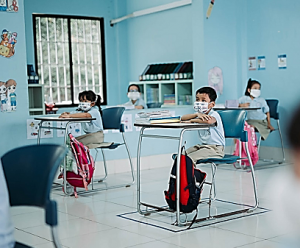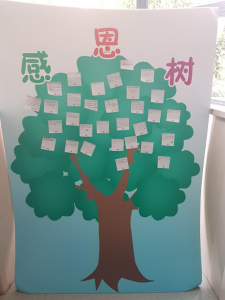[shared_counts]
Author: Professor Charlene Tan

Students wearing masks and maintaining social distancing in a classroom Source: Solomon Koo
We live in a post-pandemic world that is marked by disrupted learning and diminished well-being, especially for students from low socioeconomic backgrounds (Tan, 2021). A silver lining in the midst of educational difficulties is the opportunity for policymakers, researchers and educators to review, rethink, and reimagine the existing educational theories, models, and practices to improve student wellness. In this blog, I would like to share my vision of education that is inspired by my reading of 论语 Lunyu (Analects), a classic that records the teachings of 孔子 Kongzi (Confucius). In what follows, I propose a Confucian curriculum that develops wholeness in the learners by being broad-based, practice-oriented, collective and ethical (Tan, 2017).
First, a Confucian curriculum is broad-based in the sense that it requires the student to learn widely (e.g., Analects 6.27, 9.2, 19.6; all citations refer to this text and are translated by me) and enrich oneself with culture (文wen) (9.11). Culture in ancient China was comprised of the “six arts(六藝 liuyi)”, namely 礼li (ritual propriety or normative behaviours), music, archery, charioteering, calligraphy or writing, and mathematics. It was a holistic curriculum that promoted wholeness in every student. The learning objectives included the cognitive (mathematics) physical (archery, charioteering), as well as social, emotional, and spiritual (music, calligraphy, ritual propriety) development of the learner. In addition, a Confucian curriculum is practice-oriented by linking theory to practice. Confucius rejected mindlessness, which came in the form of rote-memorisation and indoctrination. Underlining the combination of receiving new information and mulling over it, Confucius noted, “Learning (学xue) without reflection (思si) leads to bewilderment; reflection without learning leads to perilousness” (2.15). Confucius asked rhetorically, “If a person can recite three hundred poems but is incapable of performing an entrusted official duty and exercising one’s initiative when sent abroad, what good are the many poems to that person?” (13.5). Instead of memorisation and regurgitation, learners should conscientiously apply the lessons derived from the poems to all of life’s circumstances and challenges. A suggestion for educators to promote a broad-based and practice-oriented learning in schools is group projects that apply the design thinking principles of interdisciplinary thinking, human-centredness, empathy and participation (Tan & Wong, 2012). A case in point is a school in Singapore that adopts design thinking, where students work collaboratively under the facilitation of their teacher “to research, brainstorm, design and co-create innovative solutions with the intent to address people’s needs” (Westwood Secondary School, 2015, para 3).

A “Gratitude Tree” for students to post their thanksgiving items Source: Charlene Tan
The next major feature of a Confucian curriculum is that it is collective and ethical. Such a curriculum goes beyond individual benefits to attend to collective and broader-based concerns. Accompanying one’s personal awareness and attention is the attitude of 和 he (harmony) where one promotes and preserves peace and unity with others. An exemplary person, from a Confucian viewpoint, is one who thinks, feels, and acts with grace and ease, following one’s “heart-mind’s desires without overstepping the line” (2.4), i.e., without transgressing ritual propriety. A Confucian school community, it follows, embraces diversity that transcends characteristics such as ethnicity, religion, language, and gender. It promotes social justice by reaching out to and caring for the under-privileged such as children from low socioeconomic backgrounds and the sick in the school and society. A recommendation is the enactment of appreciative inquiry-based programmes that are strengths-based, collaborative, and coevolutionary, uniting all people regardless of backgrounds (Cooperrider & Whitney, 2005). McQuaid (2017) noted the following examples of students’ activities that showed their application of appreciative inquiry: “Students have seized opportunities at a whole school level to practise their growth mindsets on ‘Have a Go Day’, perform random acts of kindness, say ‘hello’ to people they don’t know, write letters of gratitude (to each other and even their parents!), and spot the strengths in their teachers and fellow students” (p. 84).
In sum, the vision of realising wholeness in students entails that schools should go beyond cognitive learning to other developmental aspects of the students. Educators need to create and sustain school communities that are grounded in and distinguished by humanity and love. This would promote wholeness in students as they learn, interact, and grow in safe and loving environments.
Acknowledgement
Thanks to Solomon Koo for permission to reproduce a photo of Life International School.
References
Cooperrider, D., & Whitney, D. D. (2005). Appreciative inquiry: A positive revolution in change. San Francisco, CA: Berrett-Koehler Publishers.
Tan, C. (2017). Confucianism and education. Oxford Research Encyclopedias. Retrieved from https://oxfordre.com/view/10.1093/acrefore/9780190264093.001.0001/acrefore-9780190264093-e-226
Tan, C. (2021). Mindful education: Insights from Confucian and Christian traditions. Singapore: Springer.
Tan, C., Wong, Y. -L. (2012). Promoting spiritual ideals through design thinking in public schools. International Journal of Children’s Spirituality, 17(1), 25-37.
McQuaid, M. (2017). Creating whole-school positive education strategies that last. In M. A. White, G. R. Slemp, & A. S. Murray (Eds.), Future directions in well-being: Education, organisations and policy (pp. 81-85). Cham: Springer.
Westwood Secondary School. (2015). Distinctive programmes. Retrieved from http://westwoodsec.moe.edu.sg/co-curriculum/distinctive-programmes